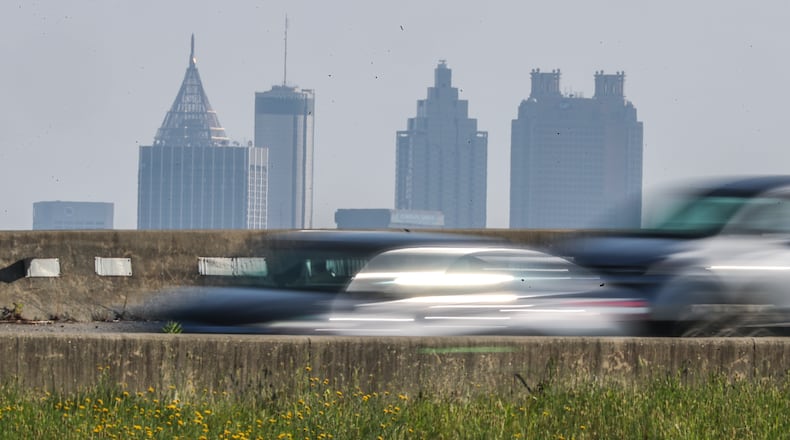If your Memorial Day weekend plans include driving or catching a plane from Atlanta, you can expect company — and possible traffic delays.
After a year of COVID-19 restrictions, experts expect many more people will travel this holiday. AAA predicts most Georgians who will travel during the May 27-31 holiday period are expected to travel by car. Memorial Day weekend gas prices haven’t been this high in 7 years.
Here’s an overview of what you need to know about allowing extra time and, if you are flexible in when you leave, the worst times you might want to avoid while traveling this weekend.
If you’re still deciding, the Atlanta weather is supposed to be nice starting Saturday
On Atlanta highways
Traffic volume on Atlanta highways was expected to pick up beginning Thursday afternoon as holiday travelers mix with commuters, according to the WSB 24-hour Traffic Center.
Based on past traffic patterns, the Friday afternoon rush hour is also expected to be heavier, starting as early as 11 a.m. on the south side of Atlanta on the roads and highways that lead to Interstate 75 south toward the beaches and Florida. AAA said drivers could take three times longer than normal to navigate the most congested stretches of highway.
“Expect I-75 in Henry County to be a mess most of the weekend,” advises Doug Turnbull, WSB traffic reporter. “Try and use a Peach Pass during times when the freeway is jammed. We highly recommend checking your ride on 95.5 WSB and on our Triple Team Traffic Alerts App before getting stuck in one of the inevitable slow zones.”
On tap of that, add weather to the mix, which can increase the chance of crashes. The Atlanta weather forecast calls for rain during the Friday afternoon commute.
Another of the busiest times may be at the end of the weekend, on Monday and Tuesday as travelers return to Atlanta from their holidays.
Traffic reporter Ashley Frasca noted there is still some uncertainty in predicting precise times for bad traffic, because driving patterns have changed during COVID restrictions. This means bad traffic can happen at unexpected times. “Please remind motorists just to be safe, follow the posted speed limits, leave plenty of space between themselves and the vehicle in front of them, and to not drive distracted,” Frasca said.
Georgia DOT has suspended construction work beginning at noon Friday through 5 a.m. Tuesday, Frasca noted. “That will help ease congestion a ton!”
Turnbull agrees about the COVID effect. “Traffic is less predictable now than before COVID,” he said. “There are more people out and about – most times of day – and going in different directions.”
At the Atlanta airport
The pain points for those who are flying in and out of the Atlanta airport this holiday will be finding parking and the lines for checking baggage and going through TSA security.
Hartsfield-Jackson International is preparing for 1.5 million people to pass through the airport over the six-day Memorial Day travel period that began Wednesday.
Airport officials say passenger traffic is more than 70% of pre-pandemic levels. Security wait times have exceeded 40 minutes during recent peak times. Travelers can check security wait times on atl.com.
The busiest day of the holiday weekend is expected to be Monday, when an estimated 290,000 to 300,000 passengers are expected to pass through Hartsfield-Jackson.
After Monday, the second busiest day during the Memorial Day travel period will be Saturday (May 29), followed by Tuesday (June 1), then Friday (May 28).
Mornings are generally busiest for departures, but holidays can be unpredictable because they aren’t governed by work schedules. There also may be peaks throughout the day, based how many planes are arriving or departing at that hour.
Officials recommend travelers arrive at the terminal two hours before their flights, to wear masks as federally required in airports and on airplanes through Sept. 13, and to check their bags for items not allowed through security checkpoints including guns, other weapons and prohibited items.
Reporters Kelly Yamanouchi, Alexis Stevens and Brian O’Shea contributed to this article.
About the Author
Keep Reading
The Latest
Featured


